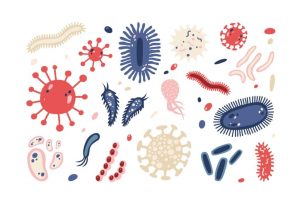What is the immune system?
The immune system plays a vital role in protecting our body against infections and several other diseases including those that occur due to inflammation, oxidative stress, and autoimmunity. This marks the need to strengthen our immune system in order to reduce our risk of disease development.
It encompasses a vast variety of cells, antibodies, proteins and chemicals that work together in the same way that a combination of specialised weapons system, army, navy, air force and the like might all be marshalled to fight an invasion.
What is the immune system supposed to attack?
The answer is this: anything that doesn’t belong. It could be foreign organisms, like viruses, bacteria, fungi or parasites. These are called pathogens. It could be a cell of the body that is infected with a foreign organism – called a pathogen-infected cell. It could also be some other foreign material: toxins, bacterial fragments, cell fragments, protein fragments and even foreign objects like dirt.
Signs of the weak immune system
- Repeated infections especially in the upper and lower respiratory tract and urinary system
- Symptoms of allergies like rashes, itching, redness of the skin, breathing difficulties, and swelling of the face
- Increased risk of autoimmune diseases like arthritis and thyroiditis
- Vulnerability to develop diseases linked to inflammation and oxidative stress like cancer and diabetes
Root causes of poor immune function
Stress
Mental and physical stress can cause the immune system to overwork making it weaker and less effective. Stress also affects the digestive system or gut which contains up to 75% of your immune system.
Poor diet
An inflammatory diet with poor fats, high sugar, food additives and toxins stress the body and cause poor immune function. Lack of essential nutrients in the diet like vitamin C, vitamin D, iron, B vitamins can reduce the efficiency of the immune system putting you at risk of immunological disorders.
Lack of oxygenation
Inadequate supply of oxygen due to reduced circulation, mitochondrial dysfunction and shallow breathing can impede immune function.
Dehydration
Reduced water intake can prevent the body from getting rid of toxic metabolites through urination. The accumulation of these toxins in healthy tissues can affect cellular processes and therefore affecting cellular immunity.
Poor sleep
Poor sleep can disrupt hormonal balance in the body and therefore influences overall immunity. The importance of sleep cannot be understated, as proper rest is vital for a strong immune system. When asleep, T-cells and proteins called cytokines are released, both of which play important roles in a strong immune system. Getting an average of 8 hours of sleep per night, increases your immunity to the common cold by 32%, compared to individuals who sleep 5 hours or less per night.
Lack of sunshine
Lack of exposure to sunlight can prevent vitamin D synthesis in the skin. The deficiency of this nutrient make the immune system weaker.
Addressing the above lifestyle factors are imperative to having a strong and active defence system.
Conclusion
It is possible to strengthen your build-in defence system by ensuring your body receives an adequate supply of essential vitamins and minerals. As well as addressing some key lifestyle habits such as poor diet, stress, sleep, sunshine and dehydration. With a robust immune system, you can prevent the development and progress of a number of diseases. Your immune system does an amazing job – every single minute as we navigate a world where we live in a symbiotic relationship with microbes.


